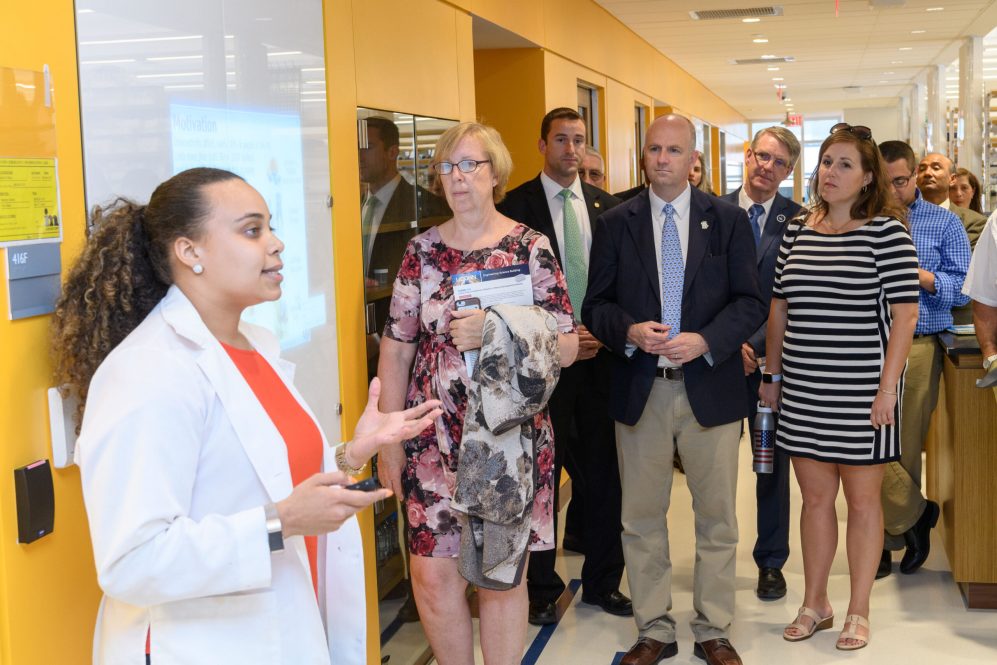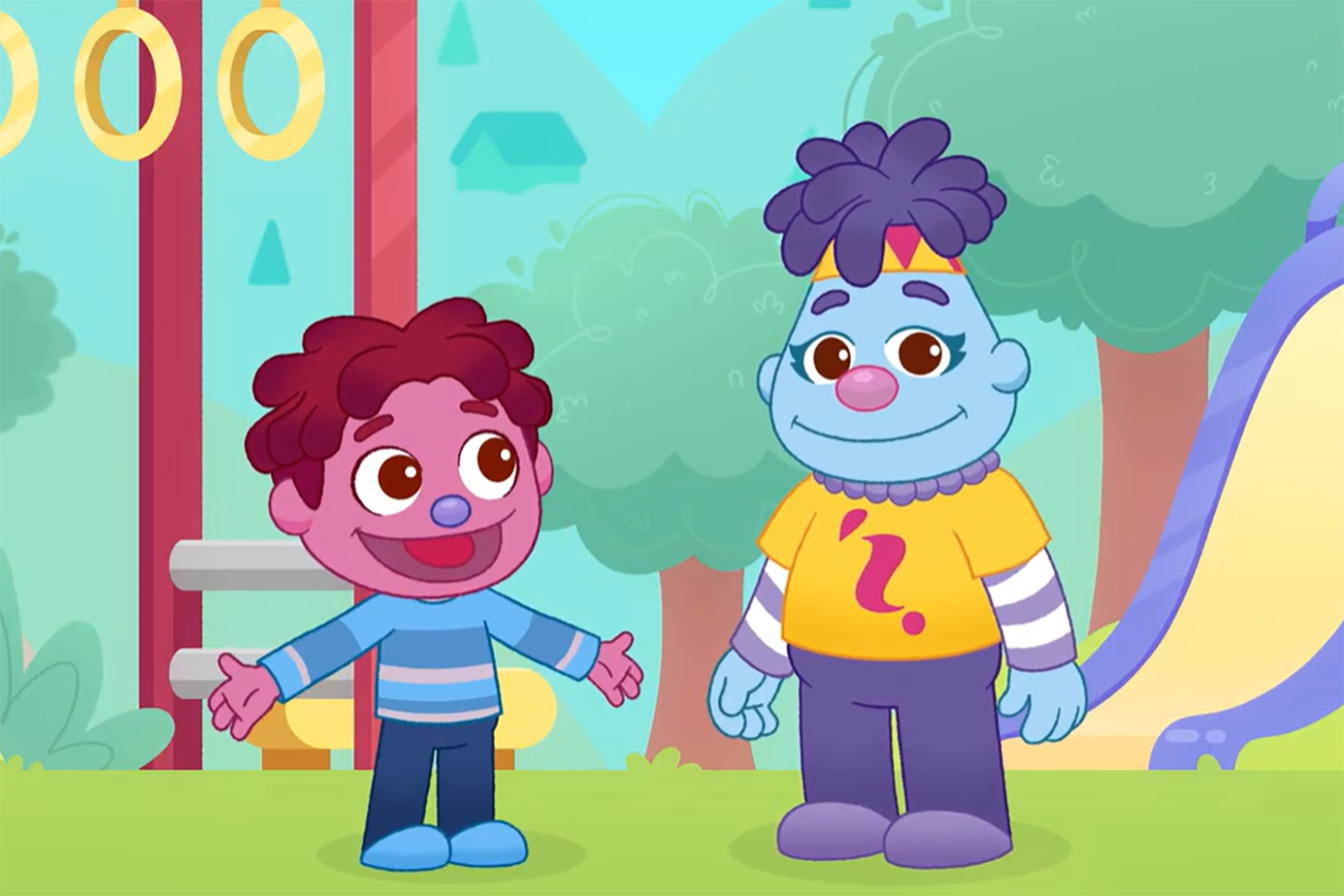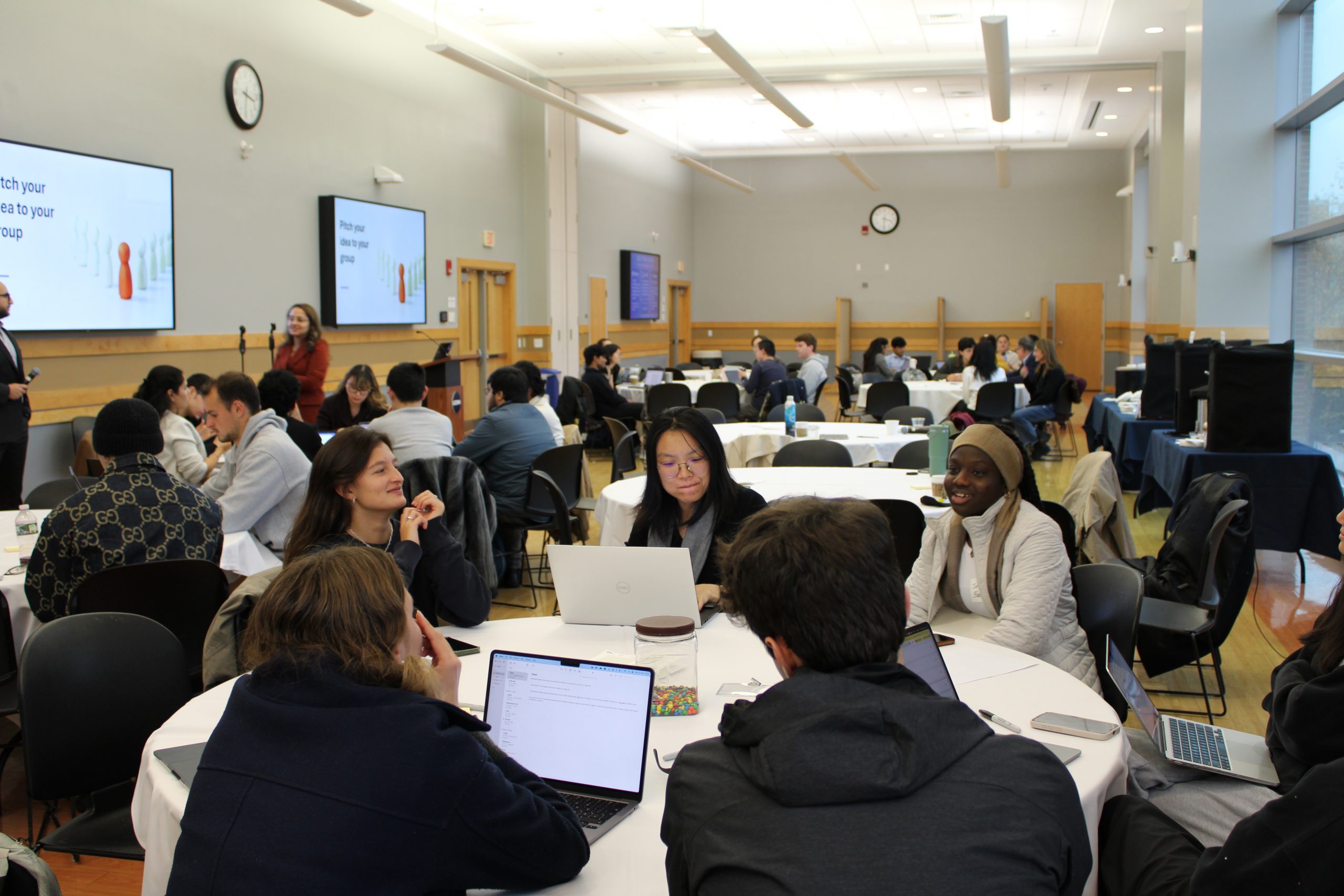By: Eli Freund, Editorial Communications Manager, UConn School of Engineering
Last week, Stephany Santos, a recent Ph.D. graduate in Biomedical Engineering, was appointed associate director of the Engineering Diversity and Outreach Center and made an assistant professor-in-residence in the Biomedical Engineering Department.
After nearly 10 years at the University of Connecticut, as an undergraduate and a graduate student, Santos has made her mark, especially in the EDOC, where she helped found Engineering Ambassadors as an undergrad–a group of hundreds of students, who help run prospective student tours, have outreach programs in local schools, and much more.
We recently sat down with Santos, and asked her about her time here, her plans for the future, and her reflections on landing her dream jobs.
- What will be your new title, and what responsibilities come with this new job?
I will be an assistant professor-in-residence in Biomedical Engineering, and the associate director of the Engineering Diversity and Outreach Center (EDOC). In these roles, I am excited to impact students on personal and professional levels. I will be teaching several courses, including ENGR 1166 – Foundations in Engineering, and co-teaching ENGR 1000 – Orientation to Engineering. These courses in particular deeply excite me because of how critical students’ first years are in developing a positive and robust STEM/Engineering Identity, strong and empathetic team and communication skills, and effective planning and metacognitive understanding.
As the Associate Director, I will be co-advising many of the student organizations (such as NSBE undergraduate and graduate chapters, SHPE, SWE, and EA), and developing and teaching curriculum focused on emotionally intelligent and culturally-conscious team and leadership skills. Additionally, I will help Kevin McLaughlin and Velda Alfred Abney develop workshops and programming that serve and uplift the greater SOE community, and underrepresented students in STEM. I will continue supporting EDOC Summer programs such as BRIDGE, Explore Engineering and SPARK. Lastly, I will be conducting research in the engineering education realm to further understand our students, their communities and environment, and the impact players in this ecosystem have on each other. I’ll be seeking grants and collaborations to support this important work.
- You’ve been at UConn for nearly a decade between undergrad and graduate school. How does it feel to land a job here?
It still feels like I’m in a dream. I remember in elementary school I was tall for my age, so I grew up playing and loving basketball. I looked up to the great Diana Taurasi, Sue Bird, and Swin Cash, and dreamed of playing basketball for UConn. Unfortunately, I stopped growing in 5th grade, and didn’t have much of a chance playing power forward at this powerhouse institution. But still, UConn became my home. Fast forward to now, to be honest, I cried when I received my offer letter from UConn. Never have I felt so wanted, supported and uplifted, and I truly thank Dean Kazem Kazerounian and Dean Dan Burkey for not only putting their names in the ring when I entered the academic job market, but for creating this incredible opportunity to be able to stay.
- Let’s go back to your experience here when you were an undergrad. What were some of the most defining moments during that time, and how do you want to translate those experiences to your new post in EDOC?
There are two events that I’ll bring to the table here:
(1) I remember it was 3 a.m. on a Wednesday sophomore year. We just ordered D.P. Dough and it was set to arrive in 30 minutes. I was hangry. We had been working through a problem set since 8 PM, and I was emotionally done. I was stuck, we were getting nowhere, and I was questioning why I chose engineering. The people I was studying with were some other students that participated in the BRIDGE program at the same time I did, or as I call them, some of my BRIDGE family. We had a quick vent session, picked up each other’s pieces, and promised each other that this too shall pass, and we needed to push through. If not for us, but for the culture.
(2) I visited a middle school at the end of sophomore year with a hands-on activity and a story about how engineers help change the world. I vividly remember one girl, who came up to me after my presentation and said “Miss, so you’re an engineer?” I nodded. She said “I want to be an engineer just like you.”
These two hallmarks showed me the importance of community and the importance of role models. Community gets us through our darkest hour, and outshines our brightest moments. Through EDOC, I hope to continue to create opportunities for students to build community and find their families away from home. Many of our students are first generation, are ‘the only’ in their classes, or may not have many other mentors or support systems. I also hope to continue EDOC’s mission of letting everyone know they are role models, and mentor up and mentor down. Every individual can have an impact on another person; you never know whose life you can change.
- What makes EDOC such a unique and crucial piece to the School of Engineering?
UConn has one of a handful of Diversity, Outreach, or Inclusion Centers dedicated to a School/College of Engineering in the country. When you look at what we’ve done over the past decade, and what Kevin has done since 2004, we have had a tremendous impact on students through our ever-growing programming. One of the things that makes us unique is how much trust, power, and autonomy we give students. There are not many other universities that would let undergraduate students be fully in charge of nearly every detail for an event that serves hundreds of children and their families in the community. Or, voice their ideas for a brand new large scale event (i.e. Sisters in STEM), and provide support and funding to bring it into fruition. We provide so many opportunities for students to learn different skills and grow, such as through serving as a Pre-Engineering Program (PEP) teacher where you learn to actually develop classroom curriculum, to working in the office where you learn everything from making a Pivot Table in Excel, to maintaining a website. We also provide a suite of courses, such as ENGR 3025 – Engineering for Impact, which is catered to their leadership needs and goals, and ENGR 3020, which is Confidence and Communication Skills. I’m so proud of what EDOC is, and what it will continue to grow to be as we expand programming to reach and support even more students.
- You were one of the founders of Engineering Ambassadors here. How have you seen that group grow, and what do you see as the future of that organization now that you’ll be focused on them and other programs administered by EDOC?
I went back through my emails recently, and found that our very first EA meeting was September 2, 2010. It is wild to see we are approaching our 10th birthday. In the beginning there were a handful of us that were dedicated to the mission (shout out to Danica Chin [Plaskolite], Kayla Johnson [Pratt & Whitney], Dan Jaramillo [Pratt & Whitney], Nick Clements [Hexcel], Cara Redding [Pratt & Whitney], Josh Leveillee [Univ. Illinois, Urbana-Champaign] Dave Golfin [Pratt & Whitney], Alex Brittain [Global Foundries], Kim Sayre [US Government], Kim Reindl [Collins Aerospace], and many others) , now we have over 200 students who are in new branches called Presentation Team (which primarily focuses on off-campus interactions with middle school students), Tour Guides (which primarily focuses on on-campus, personalized experiences with high school students and their families), and Greater Body (which supports on-campus activities, and programming such as STEM Night at the CT Science Center, and Engineers Week at the Storrs Campus). We’ve recently even initiated expanding Engineering Ambassadors, or STEM Ambassadors at the Stamford and Avery Point campuses to better serve and reach CT schools in those areas.
Looking forward, I am excited to collaborate more with PK-12 teachers, the Neag School of Education, and CETL to create an ecosystem of teaching, learning and mentoring. We’d love to be able to train ambassadors to understand Next Generation Science Standards (NGSS) so that we can work with educators to better design activities, presentations and conversations around what kids are currently learning in school. We’d also love to provide a community of practice for PK-12 teachers around the state so that teachers feel appreciated and supported, and know how they can support and help their students go to college, and become future STEM studiers and STEMinists.
- Why do you think you’ve stayed at UConn so long? What is it about this University and School that makes you so invested?
When I needed someone to turn to, there were people that not only answered my questions, but took me under their wing to help me to fly. There are amazing, selfless individuals such as Aida Ghiaei and Kevin McLaughlin who invest their entire souls for students to stand up and shine. Everyone deserves that mentor and advocate, and I’d like to stand alongside them to be that person for others. At UConn, you’re not a number, and if you volunteer your time to help, UConn will always have your back and reward you. I had no issues finding funding for my Masters or my PhD because of the support at UConn, and even now, seeing that the UConn School of Engineering still hired me in the middle of a pandemic while other universities are furloughing their staff, rescinding offers, and freezing hiring, shows UConn’s values and commitment to me, and to others they care about.
Of course UConn has areas for growth, particularly in the diversity, equity, and inclusion space, but I see avenues for change that I can be a part of, and I can’t say that about everywhere else. I’m excited by the leadership of Dean Kazerounian and Dean Burkey, and their investment in programs and courses I’ve helped pitch such as the John Lof Leadership Academy for Graduate Students, or the BOSS LADI (Building our Sister’s Strength – Leveraging Adversity, Diversity, and Intellect) class for underrepresented women in STEM. UConn loves, and UConn loves hard.
- Has it always been your dream to be a professor and mentor to engineering students who are underrepresented minorities? Why? What was your inspiration?
As an undergrad, after a few years of volunteering for events like Multiply Your Options (MYO) and for NSBE and EA, I realized I loved teaching. Senior year, I wasn’t sure exactly what I wanted to do, so I applied for Graduate School, Teach for America, and positions in industry. I was accepted to Teach for America, and was set to be a science teacher in Newark, NJ. Shortly after, I was accepted to be an EAGLES Fellow, which was a dual degree M.S. program in Italy and at UConn. I was incredibly torn, because I was excited to teach the kids, but I was also thrilled to be accepted to get an M.S. in Italy. I turned to then Dean Mun Choi who gave me one of the greatest pieces of advice I’ve ever heard, “The more you learn, the more you can teach others.” That advice kicked off my graduate school career, as well as fueled my interests in engineering education. Now, as I’ve been sharing my career plans with some of my current undergraduate mentees, I saw their eyes light up when I say I wanted to be a professor. Many expressed excitement to have a professor “like me,” which can mean a lot of things from identity (Afro-Latina, child of immigrants), to one deeply invested in individual success and well-being. I love using #ILookLikeAnEngineer or #ILookLikeAProfessor because I am breaking stigmas and stereotypes that exist in these domains, and showing students they can be one too.
- Now that you’ve landed your dream job, what do you hope to accomplish here at the School of Engineering?
Many of my aims come from a coalition of alumni who care (some I listed before), my mentees, and my mentors. I touched on many of my aims throughout this interview, but to summarize:
- Collaborate with Dean Burkey, Dean Leslie Shor, Dean Kazerounian and others to include teamwork and communication skills in undergraduate and graduate courses to minimize incidents such as microaggressions, and maximize belongingness, effectiveness, and productivity.
- Use evidence-based research to both assess and improve our current diversity, equity, inclusion and outreach efforts.
- Coordinate with other talented folx at EDOC (shout out to Esther Chang) to develop a suite of workshops, programs, courses, and trainings that uplift, inspire, and push forward individuals spanning the gamut of PK-12 students, PK-12 teachers and guidance counselors, undergraduates, graduates, staff, and faculty.
Many people say they want life to return back to ‘normal’ after COVID-19. I’ve seen others say ‘normal’ is not an option, because it includes systemic inequities in our health care, in our education, and in our access to basic needs. I agree, ‘normal’ is not an option, only forward, where empathy, communication, and progress are at the core of all we are, and all we do.



